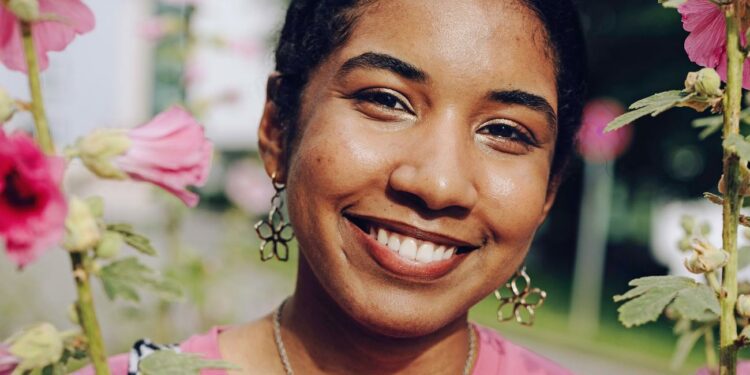Sarah Berment always loved nature. Growing up on the Caribbean island of Trinidad, her grandparents encouraged her interest in environmental sustainability from an early age.
“They both taught agriculture at public secondary schools across the island and would take me to visit farms when I was 3 or 4,” the 22-year-old recalls. “The backyard of their house in the town of Chaguanas is still full of fruit trees: plum, star fruit, coconut, banana, avocado, cherry, mango, pomerac, citrus, and pommecythere,” she recalls “The way that they live is so sustainable. They reuse and recycle almost everything. TheyтАЩre such self-sufficient people.”
Home to lush forests, wetlands, and mountain ranges, the Republic of Trinidad and Tobago (or T&T, as she calls it) is exceptionally biodiverse. But as the largest producer of oil and gas in the Caribbean, it has been economically reliant on fossil fuel exports for decades. The discord between the islandтАЩs natural beauty and environmental impact of its primary industry nudged Berment toward an interest in renewable energy. She now studies energy systems engineering in Bavaria тАУ at the European Campus Rottal-Inn (ECRI) in Pfarrkirchen, a branch of the Deggendorf Institute of Technology. The program has a strong emphasis on new technologies that could transform the global energy industry.
BermentтАЩs parents live in the town of Couva on the western coast of the island, 30 kilometers south of the capital, Port of Spain, where they both work in IT and mathematics. They instilled in their daughter a love of math and science. Berment began planning her own next step into the world of engineering while working in the capital for the countryтАЩs Ministry of National Security. Her options at home seemed limited by the dominant industry. “If you want to work in engineering in Trinidad, most people end up in oil and gas, and I just wasnтАЩt interested in that,” she says. Studying in North America was prohibitively expensive, so she looked to Europe.
┬й┬аZEIT Campus
Newsletter
ZEIT CAMPUS-Newsletter
Vielen Dank! Wir haben Ihnen eine E-Mail geschickt.
Pr├╝fen Sie Ihr Postfach und best├дtigen Sie das Newsletter-Abonnement.
Arriving in Pfarrkirchen in 2021, she found a quiet Bavarian town with a population of 13,000. It was the middle of a cold winter and a COVID lockdown. “The most obvious shock was the weather,” she says, but there were cultural adjustments to make too. Even now, she misses the cultural diversity of her homeland most.
“It has made me really appreciate the cultural melting-pot that is T&T,” she says. “Having access to parts of other cultures, like food, or celebrating other religious festivals. ThatтАЩs how I grew up.” TrinidadтАЩs cuisine is a dizzying mix of flavors and influences тАУ from West African, Indian-South Asian, Chinese, and European to Amerindian, Creole, and Latin American тАУ reflecting the islandтАЩs diversity.
But Berment was actually looking for that culture shock. “I just wanted to be somewhere completely new,” she says.
PfarrkirchenтАЩs ECRI eased the transition. One of GermanyтАЩs only exclusively English-speaking college campuses, it boasts a very high percentage of foreign students. Some of her peers were facing the same challenges of being far from home while adjusting to life in a small German town.
But on campus, Berment found a lively forum for different perspectives and life stories. “ItтАЩs been incredible to meet so many people all engaging in real life political discussions,” she says. “It forced me to improve my understanding of whatтАЩs happening around the world, and … to learn more about my own country.”
Without any big-city distractions, Berment has indulged her love for nature, cycling to the lakes in nearby Postm├╝nster or Bad Birnbach, hiking through the forests surrounding Pfarrkirchen, and visiting local farms.
In the winter semester of 2023тАУ24, Berment left Pfarrkirchen for an internship with Bosch in Stuttgart, which introduced her to new aspects of the energy sector. It changed the way she understands the industry and her potential future role in it, she says. As assistant to a PhD candidate researching thehydrogen economy, she immersed herself in policy research, reading and analyzing national energy strategies from around the world to understand how renewable sources of energy are being incentivized.
“It really opened my eyes to the state of renewable energies and the state of climate change in the world right now,” she recalls. “When youтАЩre studying engineering, you learn about all of these cool technologies and innovations. But you donтАЩt always learn about the next step, which is implementing them.”
Since completing the internship, Berment has been thinking about taking her own academic career in the direction of policy. It gave her more solid ideas for her bachelorтАЩs thesis next year. After that, she plans to stay in Germany to complete a masterтАЩs. SheтАЩs not yet sure in which field. ItтАЩs possible, how- ever, that her interest in global energy policy could one day take her back to where it all began.
“As an oil and gas producing nation, there isnтАЩt really any incentive for building up the renewable energy industry in Trinidad and Tobago,” she explains. “After spending some more time here, it would be great to go back to Trinidad and, taking what IтАЩve learned, work in policy to start developing those incentives.”
Sarah Berment always loved nature. Growing up on the Caribbean island of Trinidad, her grandparents encouraged her interest in environmental sustainability from an early age.
“They both taught agriculture at public secondary schools across the island and would take me to visit farms when I was 3 or 4,” the 22-year-old recalls. “The backyard of their house in the town of Chaguanas is still full of fruit trees: plum, star fruit, coconut, banana, avocado, cherry, mango, pomerac, citrus, and pommecythere,” she recalls “The way that they live is so sustainable. They reuse and recycle almost everything. TheyтАЩre such self-sufficient people.”
Source link : http://www.bing.com/news/apiclick.aspx?ref=FexRss&aid=&tid=66bdb093e4fc4f32a17d963fde3bc4dc&url=https%3A%2F%2Fwww.zeit.de%2Fcampus%2Fzeit-germany%2F2024%2F01%2Fpeople-from-couva-to-pfarrkirchen&c=7349364247197989950&mkt=en-us
Author :
Publish date : 2024-08-14 19:00:00
Copyright for syndicated content belongs to the linked Source.












